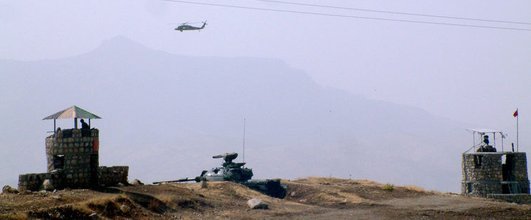Turkey In Iraq Buildup After PKK Attacks
The developments come in wake of the death of at least 12 Turkish soldiers, 2 police officers, a village guard and 3 militants of the outlawed Kurdistan Workers Party (PKK) in an upsurge of violence in the troubled Southeast region this week.
As funeral ceremonies were being prepared or held in various parts of the country for security personnel killed in action, and wreaths sent by government ministers were destroyed by participants angered at the government's policies, President Ahmet Necdet Sezer approved the controversial Anti-Terror Law that will further restrict reporting on "terror" related issues.
Although Sezer's approval came with a decision to take some of the articles of the Law to the Constitutional Court, its draconian nature is still challenged by human rights activists and jurists.
Monday saw a flurry of diplomatic action in the Turkish capital where the ambassadors of the United States and Iraq were summoned to the Foreign Ministry and told they should take concrete steps to curb PKK presence in Iraq.
"Enough is Enough"
Ankara's warning to both countries was that either they do something in practice to stop the PKK, which Turkey claims to be using Iraq as a safe haven to launch attacks in its territory, or that Turkey might be pushed to do it itself "cross-border".
The United States Ambassador Ross Wilson's urging of Turkey not to take unilateral action but instead to "functionalize a tripartite mechanism" in the fight against terror was repeated in a public statement afterwards.
Asked by a journalist "what would happen if Turkey entered northern Iraq to defend itself?" after a comment he made on Israel's right to self-defense, Wilson responded: "to work jointly on this issue would be more beneficial if you did not act unilaterally".
A statement, which Prime Minister Recep Tayyip Erdogan rebuffed on Tuesday saying "an ambassador or ambassadors don't take the decision on such things".
Referring to Wilson's remarks as being "very wrong if he made them", Erdogan said in relation to a cross-border operation, "the authorized establishments of the Turkish Republic government can take decisions on such a thing. We will make a decision we will enforce it. But what is the issue? If there is a country interested, we would like to [decide] together with these interested countries."
Political Directive: "Get Ready"
Press reports coming amid local reports of growing troop deployment in the border region have it that the government has practically issued a "political directive" for the Turkish military to "plan and prepare" for a possible incursion into Northern Iraq.
While local media reports have it that the military buildup continues, pro-Kurdish Firat News Agency (ANF) alleged on July 18 that military aircraft had been carrying new supplies to Diyarbakir province throughout Monday night. It also claimed that all leaves of military personnel in the region had been cancelled.
Although discussions at a cabinet level anti-terror summit yesterday heard various proposals including re-instating a State of Emergency in the Southeast region, government spokesman Cemil Cicek sufficed to say after the meeting that Turkey would use all of its rights entitled to it under international law - further implying a readiness to launch a cross-border operation.
"All means are to be mobilized" Cicek said told reporters, adding, "the fight against terrorism is our number one priority".
HPG: "End of Patience"
Coinciding with the fast track developments in Ankara, the PKK's armed flank Peoples' Defense Forces (HPG) issued its own statement on Monday where it warned that it had come to the "end of patience".
The statement, carried by the pro-Kurdish Firat News Agency (ANF) in full, said the region was going through "a real war condition" and blamed Turkey's preparations and operations since the beginning of the year for "escalating the war".
Referring to the new Anti-Terror Law approved by the president as a "war decision", the organization repeated that the government and army would be responsible of the consequences. (II/YE)




